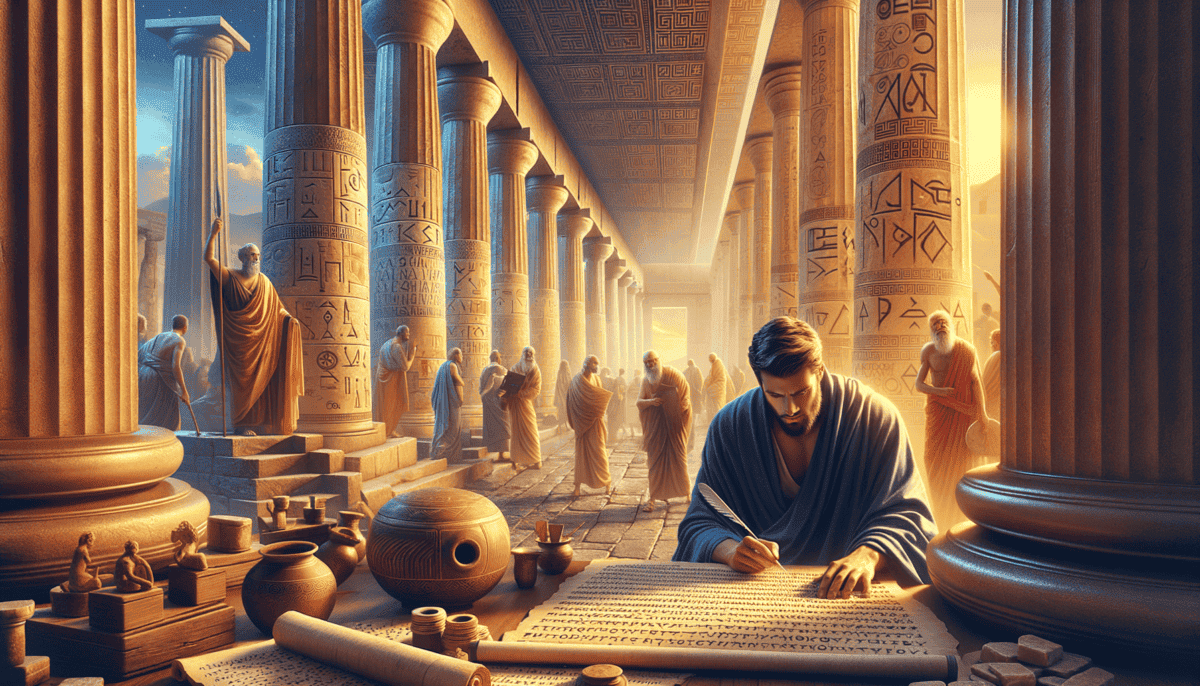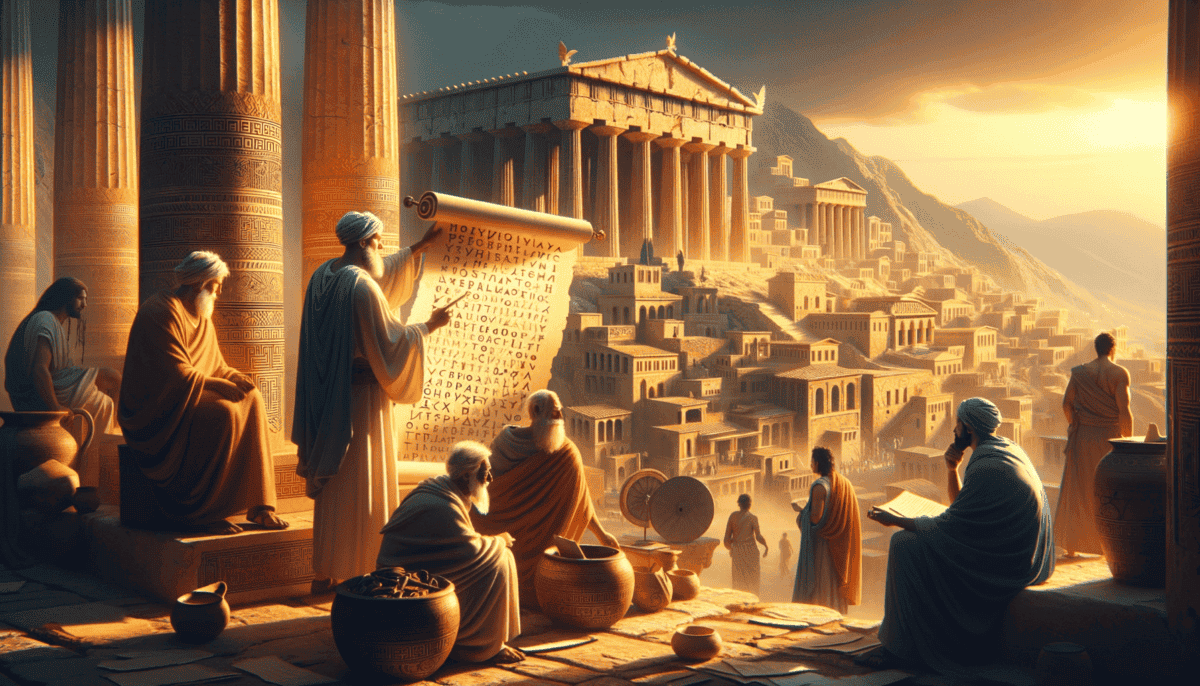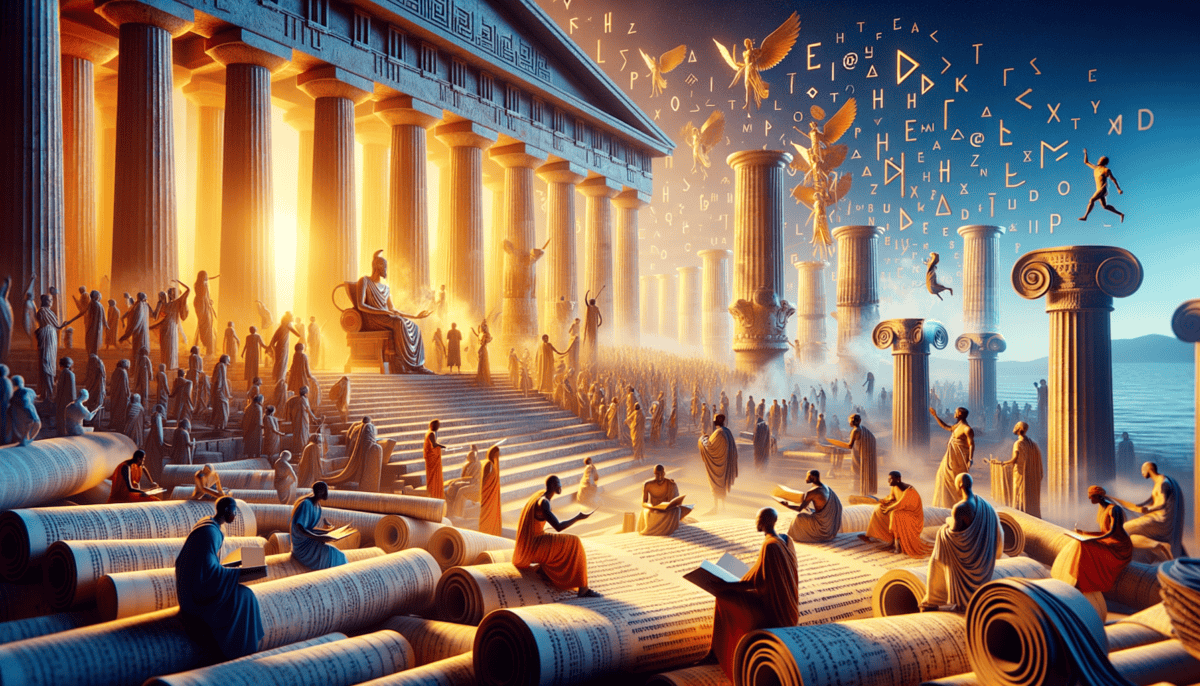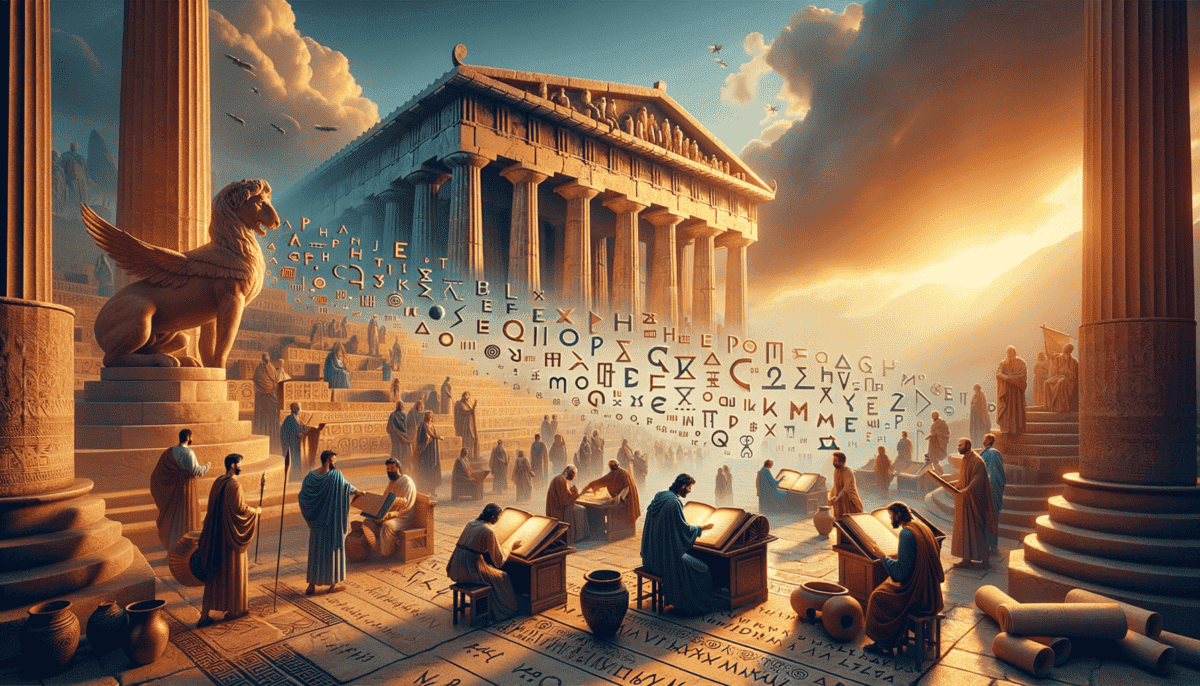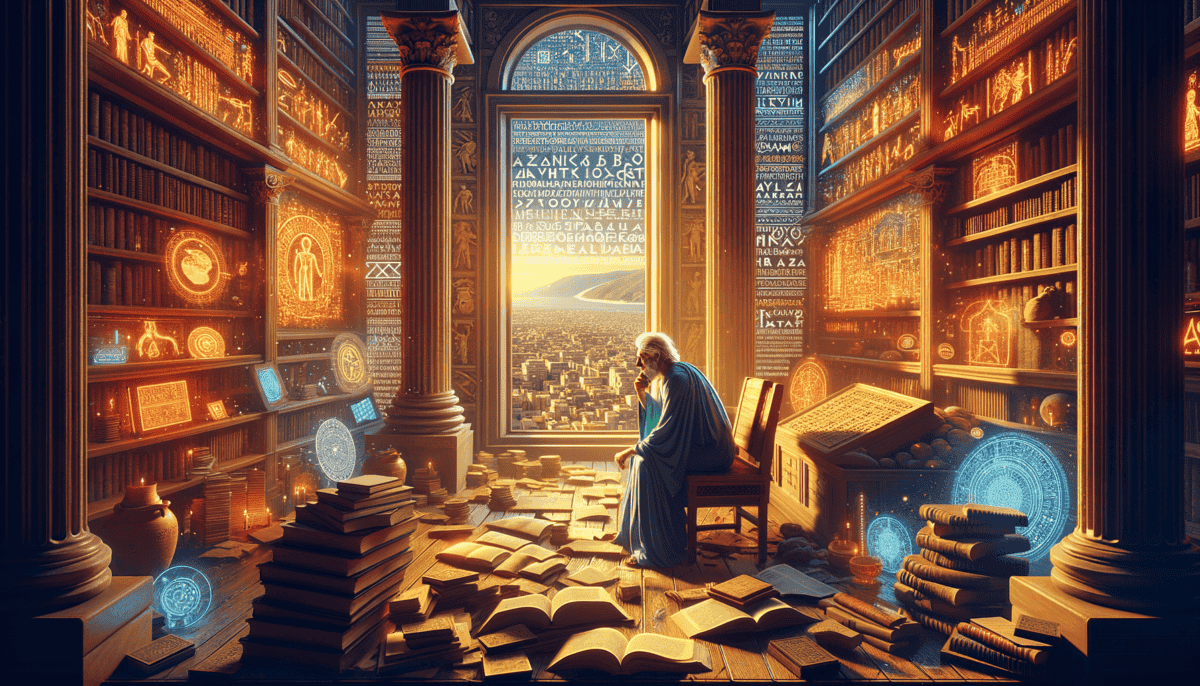The Whispers of Letters
The sun peeked through the window of young Theo's small room in ancient Athens. He sat at his wooden desk, surrounded by clay tablets covered in strange marks and pictures.
"There must be a better way," Theo whispered to himself, running his fingers over the complicated symbols. He was learning to be a scribe, but the old way of writing was so hard!
In those days, people wrote using pictures for words. If you wanted to write about a house, you had to draw a tiny house. For a bird, you drew a bird. It took forever!
Theo watched his master struggle with a big clay tablet. "Master Alexandros, why do we need so many pictures to tell one story?"
Master Alexandros sighed. "That's how it's always been done, young Theo. The Phoenicians use their symbols, the Egyptians use their hieroglyphs, and we use our pictures."
But Theo couldn't stop thinking. He noticed how every word they spoke had different sounds. What if instead of drawing pictures, they made marks for the sounds?
That night, Theo couldn't sleep. He grabbed his stylus and a fresh clay tablet. "Let's see," he mumbled. "The word 'bird' has different sounds – buh, err, duh. What if each sound had its own mark?"
He started drawing simple shapes, one for each sound he could think of. Some looked like waves, others like sticks or circles. Each mark would stand for one sound!
The next morning, Theo showed his idea to Master Alexandros. "Look! Instead of drawing a whole bird, we can write the sounds b-i-r-d with these four marks!"
Master Alexandros's eyes grew wide. "By the gods, Theo! This could change everything. But it will take lots of work to make it perfect."
“I’m ready to try,” Theo said with determination. “We can make writing easier for everyone!”
And so began Theo's amazing journey to help create something new – the Greek alphabet! Little did he know that his simple idea would grow into one of the most important inventions in history.
Master Alexandros put his hand on Theo's shoulder. "Tomorrow, we'll start working on your alphabet idea. But remember, young scribe – great changes often face big challenges."
Theo nodded, his mind already racing with possibilities. He looked at his clay tablet with its new marks and smiled. Maybe, just maybe, these simple lines and curves would help people share their stories in ways they never could before.
Learning the New Way
The morning sun found Theo sitting with his new teacher, Master Pythias, an expert in different writing systems.
“Today,” Master Pythias smiled, “we begin your real training with the alphabet.”
Theo watched as Master Pythias drew simple shapes in the soft clay. “See here, young one. This mark makes the ‘ah’ sound, like in ‘father’. We’ll call it ‘alpha’.”
“And this one?” Theo pointed to a curved line.
“That’s ‘beta’ – it makes the ‘buh’ sound. Together, they can make many different words!”
But not everyone liked the new letters. Old Scribe Marcus stormed into their lesson, waving his hands. “This is nonsense! Our picture writing was good enough for our ancestors!”
“But Master Marcus,” Theo said bravely, “with these new letters, we can write faster and teach more people to read!”
The days turned into weeks. Theo practiced making each letter perfect:
| Alpha (α) – “ah” | Beta (β) – “buh” | Gamma (γ) – “guh” |
One sunny afternoon, Theo made an exciting discovery. “Master Pythias! Look! I can write my whole name with just five letters!”
Master Pythias beamed with pride. “You see? Now imagine teaching children to write with just 24 letters instead of hundreds of pictures!”
But some challenges were still ahead. The other scribes in Athens weren’t happy about the new alphabet. They worried their old writing skills wouldn’t matter anymore.
“Don’t give up,” Master Pythias told Theo one evening. “Sometimes the best ideas take time for people to accept.”
Theo worked harder than ever. He practiced writing poems, stories, and even messages to his friends. Each day, the letters became easier to use.
One day, a merchant named Darius visited their school. He watched Theo write a message quickly in the new alphabet.
“By the gods!” Darius exclaimed. “I’ve never seen writing so fast and clear. Young man, how would you like to help me share these letters with other cities?”
Theo’s eyes sparkled with excitement. Could this be his chance to spread the alphabet beyond Athens? He looked at Master Pythias, who nodded with approval.
“When do we leave?” Theo asked, already dreaming of the adventures ahead.
The Trader’s Journey
The salty sea breeze ruffled Theo’s hair as he stood on Darius’s trading ship. The coast of Athens grew smaller behind them.
“First stop, the island of Rhodes!” Darius called out cheerfully. “Many traders gather there from all over the world.”
Theo watched the sailors work. They used marks on ropes to measure depth, but many couldn’t read the numbers.
“Would you like to learn how to read these measurements?” Theo asked a young sailor named Alex.
“You mean I could learn? I thought only scribes could read!”
“With our new alphabet, anyone can learn to read. Look – each letter makes one sound. When you put them together, they make words!”
By the time they reached Rhodes, Alex could write his own name. The other sailors wanted to learn too!
At the Rhodes marketplace, Theo met traders from many lands:
| Egyptian Merchants | Persian Traders | Phoenician Sailors |
“Watch this,” Darius told a group of merchants. “Theo can write down any word you say, in any language!”
The merchants tested him. They said words in their languages, and Theo wrote them using Greek letters. Everyone could see how the sounds matched the writing.
Some merchants laughed at first. “Our way of writing is better,” they said. But when Theo showed how quick and easy the alphabet was, many changed their minds.
As they sailed from port to port, more people learned the alphabet. Theo taught merchants how to write trade agreements. Sailors learned to read maps. Even children picked up the letters quickly!
“This is amazing!” said a Phoenician trader. “I can write letters to my family now, and they can read them!”
But not everyone was happy. In one port, an old record keeper got very angry.
“You’ll put us all out of work!” he shouted. “Who will need us if everyone can read and write?”
Theo thought carefully before answering. “Think how many more records we could keep if more people could write them. We could save so many stories and ideas!”
As their journey continued, Theo kept a special scroll. In it, he wrote down words from every place they visited. The alphabet worked for all of them!
One evening, Darius found Theo teaching a group of children on the deck.
“You know,” Darius said softly, “I think we’re doing more than just trading goods. We’re trading knowledge, and that’s worth more than all the gold in my ship.”
Theo smiled, watching the sunset paint the sea in golden colors. The alphabet was spreading, one port at a time, one person at a time. And with it, the power to share ideas was spreading too.
Letters That Change the World
Back in Athens, Theo walked through the busy streets. Things had changed since his journey. People everywhere were writing!
“Theo! Come quickly!” called Sofia, a young student. “The philosophers are meeting in the square. They want your help!”
In the square, Theo found a group of wise men talking about big ideas. They looked worried.
“We have so many thoughts to share,” said Plato, a famous thinker. “But we forget them before we can tell others. Can your alphabet help?”
Theo smiled and pulled out his writing tools. “Watch this!”
“Now we can write down every important idea. Your words won’t be lost anymore!”
Soon, the square was filled with excitement as people wrote down:
| Stories | Ideas | Laws ⚖️ |
“This changes everything!” said a young leader named Pericles. “Now everyone can read the laws. That makes our city more fair!”
But not far away, an angry group gathered. They were the old message-keepers who used to remember everything in their heads.
“People will become lazy!” they shouted. “If they write things down, they won’t use their memories!”
A little girl stepped forward. Her name was Iris, and she had just learned to write.
“Look what I can do,” she said quietly. She wrote her name in the dust. “Now I can tell stories too!”
Theo spent his days helping people use the alphabet in new ways:
• Teachers wrote lessons for students
• Doctors wrote down how to heal people
• Farmers kept track of their crops
• Poets wrote beautiful songs
• Leaders wrote messages to other cities
“Remember when we could only tell stories by speaking?” Sofia asked one day. “Now our words can travel across the sea!”
Theo watched as more and more scrolls filled the library. Each one held someone’s thoughts, safely kept for others to read.
“I saw something wonderful today,” said a merchant named Marcus. “A mother reading a bedtime story to her child. Both of them were reading together!”
Even the old message-keepers started to change their minds. They realized they could write down the old stories they knew, saving them forever.
One evening, Theo sat with his students under an olive tree. They were writing poems about the sunset.
“You’ve given us a great gift,” said one student. “Now our words can live forever.”
Theo looked at the young faces around him, all busy writing their thoughts. The alphabet had done more than help people write – it had given everyone a voice.
As the sun set, the sound of scratching pens filled the air. Athens was becoming a city of writers and readers, where everyone’s ideas could be heard.
Beyond Greek Shores
The sun rose over Athens as ships filled the harbor. Theo watched traders load boxes of scrolls onto their boats.
“Look, Theo!” called Marcus the merchant. “People from far away want to learn our letters.”
A group of visitors from Rome stood nearby. They looked at the Greek writing with wonder.
“Your letters are so simple,” said Claudius, a Roman teacher. “We want to use them too!”
Theo sat with the Romans under an olive tree. He showed them how the letters worked.
“Each sound has its own letter. See? A makes ‘ah’, B makes ‘buh’…”
The Romans got excited. They started making their own changes to the letters:
| Greek Alpha (Α) ➡️ | Roman A |
| Greek Beta (Β) ➡️ | Roman B |
“We’ll make some letters look a bit different,” said Claudius. “That way they’ll work better for our language!”
Other visitors came from different lands. The Etruscans from Italy wanted to learn too!
“Your alphabet is like magic,” said an Etruscan trader. “It can write any word!”
Sofia, now a teacher herself, helped Theo write guides for the visitors:
• How to write the letters
• How to make the sounds
• How to teach others
“Our letters are going on a big adventure,” said Theo to his students. “They’re helping people talk to each other all over the world!”
A young boy from Egypt watched people writing. “In my land, we use picture-writing,” he said. “But your letters are faster!”
Marcus returned from a long trip with exciting news. “I saw our alphabet in places I never expected! People are using it everywhere!”
Theo remembered his first days as a young scribe. He never thought his work would travel so far.
“The best part,” said Sofia, “is that everyone can make the alphabet their own. It grows and changes with each new friend it meets.”
As the sun set, Theo watched ships leave the harbor. Each one carried letters to new shores, where they would help more people share their stories.
“Our letters are like little seeds,” he told his students. “Wherever they go, new ideas grow!”
The evening stars came out, twinkling like the dots and lines of letters on a page. Tomorrow would bring more visitors, more changes, and more ways for people to connect through the power of writing.
The Legacy Lives On
Many years had passed. Theo’s hair was now white as marble. He sat in his favorite garden spot, watching children practice their letters.
“Grandfather Theo,” called little Marina, running up with a scroll. “Look what I wrote all by myself!”
Theo smiled at the wobbly letters. They reminded him of his own first tries so long ago.
“Tell us again,” the children begged, “about how the letters traveled around the world!”
“Well,” Theo began, his eyes twinkling, “it started with a dream to help people talk to each other…”
Sofia, now a wise teacher herself, joined them. “And look how far that dream has come!”
They watched as merchants from many lands filled the marketplace. Everyone used letters that came from their Greek alphabet:
| Greek Letters ➡️ | Roman Letters ➡️ | New Alphabets |
“Our letters are like a family tree,” Sofia explained. “They keep growing and making new branches!”
A group of students sat nearby, writing stories, poems, and letters to far-away friends.
“When I was young,” Theo told them, “people thought writing had to be hard. But look how easy it is now!”
Marina showed her little brother how to write his name. “See? Each letter makes a sound. Put them together, and they make words!”
Theo watched with joy. The simple idea that started so long ago had changed the world. Now everyone could:
• Write their thoughts
• Share their stories
• Learn new things
• Connect with others
“What do you think comes next?” asked a curious student.
Theo looked at the setting sun, its golden light warming the marble columns. “The alphabet will keep growing,” he said. “It will help people talk and share ideas in ways we can’t even imagine!”
As evening fell, lanterns lit up the garden. Children practiced their letters in the warm glow.
“Each letter is like a little star,” Marina said, pointing to her writing. “Together, they light up the whole world!”
Theo smiled at this perfect description. From those first simple marks so long ago, their alphabet had indeed become a light for the world – helping people share their thoughts, dreams, and stories for generations to come.
And somewhere, in places yet unknown, new writers were picking up their pens, ready to add their own chapters to the never-ending story of letters and language.
“Remember,” Theo whispered to his students, “every time you write, you’re part of something bigger than yourself. You’re part of the great story of how people learned to share their voices with the world.”
The stars twinkled overhead, like countless letters scattered across the night sky, promising more stories yet to come.


